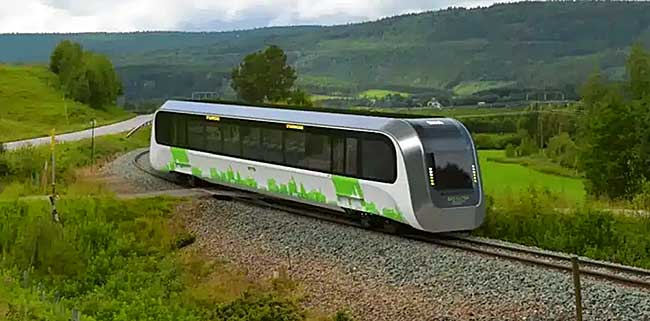Here’s what we know about the development of trains powered by human waste:
- Concept: Engineers are working on trains fueled by biomethane, a gas produced through the breakdown of organic materials like sewage sludge, food scraps, and animal manure.
- Project: Ultra Light Rail Partners in the UK is leading this initiative with their BioUltra train design.
- Technology: Biomethane is converted into electricity that powers the train’s battery and motor, achieving a clean fuel source.
- Benefits:
- Reduced Emissions: Compared to diesel trains, BioUltra aims to offer near-zero harmful emissions like nitrogen dioxide.
- Waste Repurposing: It utilizes existing waste materials, reducing dependence on traditional fossil fuels.
- Stage:
- Prototype: A functional prototype was tested in 2020.
- Development: The project is ongoing, with the goal of replacing existing trams and light rail systems.
- Public Perception: While the source material might raise concerns, the focus lies on utilizing readily available waste for a sustainable alternative.
Points to Consider:
- Terminology: While headlines often mention “human waste,” the technology primarily targets broader organic waste sources, not solely sewage.
- Public Acceptance: Overcoming the psychological factor associated with the origin of the fuel might be crucial for wider adoption.
- Challenges:
- Infrastructure: Large-scale implementation requires building facilities to efficiently process waste and convert it into biomethane.
- Production Capacity: Scaling up biomethane production to meet the fuel demands of a widespread rail network might require additional resources and planning.
- Cost-effectiveness: Balancing the cost of setting up waste processing facilities with the economic feasibility of running trains on biomethane needs careful analysis.
- Future Developments:
- Research: Further research is needed to optimize biomethane production processes and improve efficiency.
- Integration: Combining biomethane with other renewable energy sources like solar or wind power could create a more robust clean energy system for powering trains.
- Similar Initiatives:
- Biomethane-powered buses and trucks are already being piloted in various regions, demonstrating the potential for broader waste-to-fuel applications in the transportation sector.
Overall Significance:
While the technology is still under development, it presents a viable approach towards sustainable transportation. Here are some key takeaways:
- Environmental Benefits: Reduced reliance on fossil fuels and minimized greenhouse gas emissions.
- Waste Management: Provides a solution for converting waste into a valuable energy resource.
- Long-term Potential: Offers a path towards a more sustainable and self-sufficient transportation system.
It’s important to note that this technology is not yet a mainstream solution. However, continuous research and development efforts hold promise for the future of clean and efficient transportation.
Overall, this project represents a promising approach to sustainable transportation. Biomethane offers a clean-burning fuel option by repurposing waste materials, potentially leading to a significant environmental benefit.
Citation
https://www.thecooldown.com/green-tech/waste-powered-trains-uk-biofuel/
Leave a Reply
You must be logged in to post a comment.
